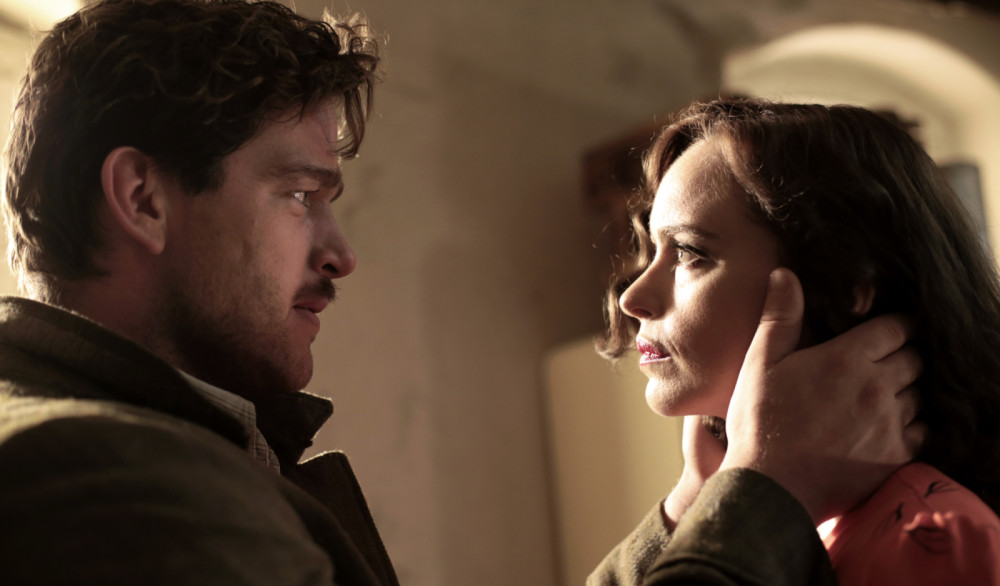
There’s the scent of two filmmakers haunting the air when one watches Phoenix, Christian Petzold’s fascinating character study of a woman who undergoes facial reconstruction after the Holocaust, leaving her barely recognizable and desperate to find her husband in post-war Berlin.
The first is Alfred Hitchcock, whose Vertigo ties directly to Phoenix in the way it features a man imposing a vision of a woman onto another woman, but also in reverse (a reverse Vertigo, if you will, though packing more of an emotional punch than tense thrills). Its leading lady, Nelly Lenz (Nina Hoss), manipulates the same man, her husband Johnny (Ronald Zehrfeld), into believing she isn’t his wife while still playing the role of his wife. She allows him to mold her, to shape her story, even though she knows it’s not the truth. It’s a simple enough plot that sounds more complex and admittedly menacing than it actually is and the comparison to Vertigo doesn’t do much to change that.
But, in fact, Phoenix is a beautiful drama, more akin to Fassbinder than Hitchcock. It’s dedicated to exploring the mental state of a woman who has quite literally experienced hell and made it out, only to be faced with the reality that her husband — who believes she died after more than likely betraying her to Nazis — wants to use the mysterious woman she’s become to earn her inheritance. And it’s through this narrative that we slowly but surely watch Nelly move from victim to survivor, albeit in a much different manner than one might expect.
“I want to look the same as before,” Nelly says when asked at the start of the film who she wants to look like. When she realizes that’s impossible, she settles for having someone else write her story. Much like the song that subtly invades so much of the film (and provides one of the most satisfying scenes in a film this year), Kurt Weill’s “Speak Low”, Nelly understands that way time forces love to change so strangely as the years, but she’s not willing to accept that. It’s fascinating to watch a woman so desperate to forget who she is that she’s willing to allow her narrative to be molded by a man who, for all realistic purposes, is terrible for her. And yet, much like Nelly believes Johnny will soon come to love the woman he believes looks like his wife, the audience believes so as well.
From behind the mask of the gauze, Nina Hoss’ eyes do all the work, but they continue to affect the audience long after the wrap comes off. Her stares, often making her look like a child just rescued from drowning, reveal more about her character than any word of dialogue in Phoenix. And regardless of her former work with Petzold (Barbara, Yella, Jerichow), it’s impossible to deny that she seems like an entirely new actress here, delivering the kind of performance that defines a career. But without a partner as capable as Zehrfeld, it would have been impossible to believe Nelly’s longing. They bounce off each other perfectly, both in scenes where they must embrace tenderness and in moments where one simply hopes that Johnny and Nelly will cut this agonizing game out.
Having mentioned two filmmakers early on, the time comes to discuss the second: Rainer Werner Fassbinder. It’s hard to describe why Fassbinder’s aesthetic immediately comes to mind when watching Petzold’s film: There’s the costuming, sifting from polished and colorful to drab and grimy when necessary; the sparse, but effective, sets that manage to create period drama that feels real; Hans Fromm’s cinematography and lighting that makes every scene pop and every stare matter. There’s even a hint of queerness that lingers in the air during scenes that focus on the relationship between Nelly and Lene Winter — played by the marvelous, restrained, Nina Kunzendorf — who essentially becomes her caretaker, but seems to love Nelly as far more than a friend.
Hand in hand with that would be something like Christopher Isherwood’s writing, in the way Petzold depicts Berlin and the sheer transparency that he and co-writer Harun Farocki have in presenting character motivations. Though maybe it’s simply the fact that Fassbinder is a German filmmaker who sifted through noir and melodrama and experimented with it, in a very similar way to the way that Petzold does with Phoenix, and each one succeeded in creating memorable pieces of cinema. Then again, maybe a viewing of the The Marriage of Maria Braun alone would serve as a more apt explanation than mine. And yet, it’s because of the fact that Phoenix wears its influences on its sleeve that is proves to be an incredibly satisfying feat of filmmaking; one that’s easy to declare a classic piece of cinema from the moment the last shot cuts to black.
—
Directed by Christian Petzold; written by Christian Petzold & Harun Farocki; based on the novel Le Retour des cendres by Hubert Monteilhet; starring Nina Hoss, Ronald Zehrfeld, and Nina Kunzendorf; 98 minutes.
Phoenix is currently undergoing a limited US release. In Miami, it opens at the Miami Beach Cinematheque and Tower Theater on August 7th, followed by the Cosford Cinema on August 14th and O Cinema Miami Beach on August 28th.



 Derek
Derek
 Isabelle
Isabelle